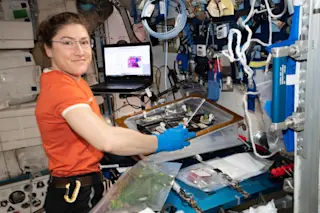NASA astronaut Christina Koch will break the record for the longest-duration spaceflight for a woman. (Credit: NASA) Ever since the space shuttle retired in 2011, NASA has been paying Russia for rides to the International Space Station. They'd hoped that dependency would finally end in 2019. But with its new lineup of flights and launch dates released this week, the space agency acknowledged they're not quite done needing Russia's Soyuz rockets yet. NASA will remain dependent on Russia for the next round of space station rotations. Thanks to delays in commercial launches by SpaceX and Boeing, which NASA has paid billions to ferry crews to ISS, the space agency is now settling on longer missions for their astronauts, who will continue to hitch rides on Soyuz rockets. In fact, the new long-term crew roster and launch dates for the next year does not list any flights on commercial launches.
NASA ...














